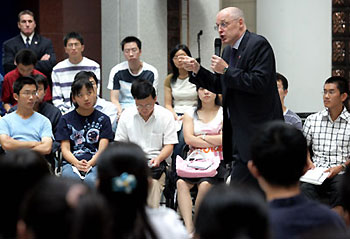BEIJING - US Treasury Secretary Henry Paulson, superstar investment banker
and Washington's new economic point man to China, stood before a student
audience Thursday and talked about reading his children bedtime stories.

US Treasury Secretary Henry Paulson speaks to
students and teachers at Tsinghua University September 21, 2006. He held a
discussion panel with the students on China-Amerian
relations. [newsphoto] |
Paulson was in
Beijing at a time of high-decible arguments over trade deficits, currency and
other issues. But he took an hour out of a packed schedule to speak at elite
Tsinghua University, where he urged budding executives to make time for family
as he also talked up the benefits for China of opening its markets to foreign
business.
The appearance reflected the new Treasury secretary's two-pronged
strategy for dealing with China, tirelessly cultivating personal contacts while
presenting himself as a friend who is urging economic reforms that will benefit
ordinary Chinese.
"I'm a huge believer in the Chinese economy," Paulson said earlier this week.
He said he wants to nurture a "more productive tone" in strained trade
relations.
The strategy is in contrast to Washington's other recent approach, which has
called on China to be a "responsible stakeholder" in global affairs and to live
up to its market-opening commitments. Some in China welcomed that tone, with its
implication that Beijing was a major power, but economic disputes festered.
Paulson's background gives him unusual authority to talk with Chinese
officials at the highest levels.
He visited China scores of times
over the past 15 years, negotiating deals for Goldman, visiting farflung regions
and amassing an array of contacts that includes senior Communist Party figures.
This week, Vice Premier Wu Yi, a former trade negotiator, called Paulson a
"true friend of China" who "understands even more about China than many Chinese
people."
But in such a huge, complex relationship, such a background has only limited
importance, said Andy Rothman, senior China strategist for the securities firm
CLSA Asia-Pacific Markets.
"The Chinese are in this for the long run, just as the United States is, and
they know that treasury secretaries will come and go," Rothman said. "They want
to have a stable, productive relationship with the White House regardless of who
the treasury secretary is, because that is in China's interest."
Instead, Paulson's resume might be a bigger asset in mollifying American
critics who want to push Beijing more aggressively to rein in its soaring trade
surpluses, Rothman said.
"He probably comes into this role with Wall Street and Congress looking at
him as a real expert, therefore making it a little bit easier for him to
convince them that he is taking the right approach," he said.
Paulson himself took pains to downplay expectations of breakthroughs from his
trip. He said he wants to nurture a long-term discussion of major economic
issues, not look for "quick fixes."
On currency, Paulson has been more conciliatory than his predecessor, John
Snow, who pursued a tough line toward Beijing, insisting on faster action to
raise the yuan's value.
| 1 | 2 |  |